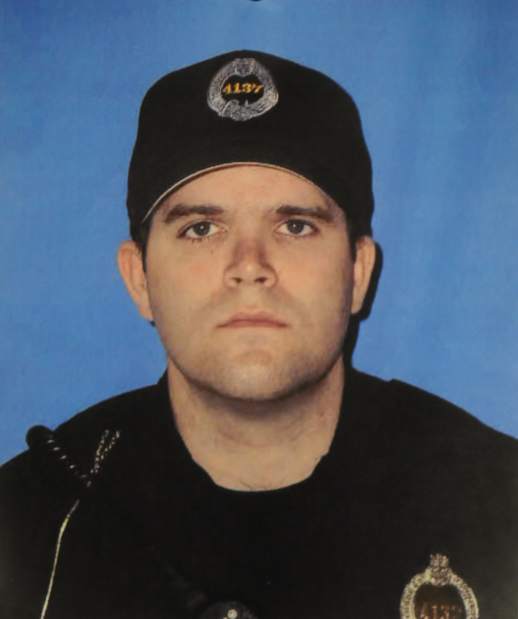Death penalty upheld for man convicted of killing 3 Pittsburgh officers
The evidence against Richard Poplawski far outweighed the impact of his hate-filled rants and Internet browser history in determining his guilt and death sentence in the killing of three police officers, the Pennsylvania Supreme Court ruled Tuesday.
Poplawski, 29, was convicted and sentenced to death on three counts of murder in 2011 for ambushing and killing Pittsburgh police Officers Eric G. Kelly, Stephen J. Mayhle and Paul J. Sciullo II at Poplawski's Stanton Heights home in April 2009.
The Supreme Court unanimously upheld his sentence in an opinion issued Tuesday, ruling that the evidence against him had been properly vetted by the court and was admissible. The state's highest court rejected the defense's argument that some evidence wasn't proper and played to the emotions of the jury.
“(Poplawski)'s three sentences of death were not the product of passion, prejudice or any other arbitrary factor, but were based, instead, on overwhelming evidence establishing that (Poplawski) fatally shot Officers Paul Sciullo, Stephen Mayhle and Eric Kelly with malice and the specific intent to kill,” Justice Correale F. Stevens wrote in the 63-page majority opinion.
Poplawski likely is a long way from execution. Federal appeals are available to him, and Gov. Tom Wolf has imposed a de facto moratorium on the death penalty, using his power to postpone executions until a state task force delivers a report on whether the death penalty is fairly and effectively applied in the state.
“It's a victory of sorts, and we still have a long way to go,” Allegheny County District Attorney Stephen A. Zappala said. “Unfortunately, these (victims') families still have to go through multiple appeals.”
Max and Sue Sciullo, parents of Officer Paul Sciullo, said they were glad to hear the court agreed with them on the overwhelming weight of the evidence against Poplawski.
“We don't even like to say his name in our house,” Max said. “He took everything away from us.”
“We feel they've made the right decision with this,” Sue said. “The appeals are a hard thing, but it's something you have to continue on until it's done.”
The Public Defender's Office, which represented Poplawski, would not comment on the ruling.
“We believe in and trust the system, and feel it's appropriate the death penalty was issued,” said Howard McQuillan, president of the Pittsburgh Fraternal Order of Police. “It's not going to change what occurred, but we believe justice will be done and we're grateful for that.”
In his appeal, Poplawski argued that neither a 911 call in which he used racial epithets nor his visits to a racist website should have been admitted as evidence because they prejudiced the jurors against him. He said prosecutors used his racism in the penalty phase to portray him as a “hater” who could hurt people again — including fellow prisoners and guards — if he weren't executed.
The court ruled that evidence supporting the first-degree murder convictions was so overwhelming that even if Poplawski's racial bias has been improperly admitted, it wouldn't have mattered in regard to the verdict and penalty.
“The jury, therefore, heard such overwhelming evidence of both guilt on which to base its verdict and aggravating circumstances on which to base its sentence that not even this all-too-familiar epithet ... could have factored in its guilt or penalty-phase deliberations,” Stevens wrote.
Poplawski argued that the prosecution went over the line in the penalty phase — during which jurors had to decide whether he'd be sentenced to death — by using overly emotional testimony and photographs from the fallen officers' families and funerals. Family members testified about one officer's blood-stained religious medallion and the need for a closed-casket funeral before Common Pleas President Judge Jeffrey A. Manning. Manning warned prosecutor Mark Tranquilli to tone down his questioning so it wouldn't be a problem on appeal.
The defense should have raised the issue during the trial, the Supreme Court ruling stated. He didn't do so until his appeal to the Supreme Court, and, therefore, it was too late, the court ruled.
In his concurring opinion, Chief Justice Thomas Saylor said prosecutors might have gone too far, but he upheld the conviction and sentence.
“I am concerned with the apparent abuse of the latitude afforded to the prosecution to introduce victim-impact evidence,” he wrote. “I would suggest that this case may present an apt vehicle, on post-conviction review, for imposing some rational limits.”
Zappala contended the emotional effect of the funeral footage and the family's testimony was unavoidable.
“By its very nature, the murder of three police officers is a very emotional event for a community,” he said.
NOTE: This story has been updated from the original to add comment from the Sciullos and Mr. McQuillan.
Matthew Santoni is a staff writer for Trib Total Media. He can be reached at msantoni@tribweb.com.








